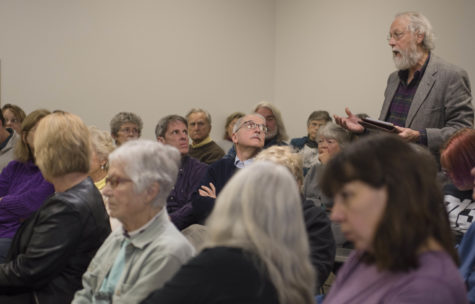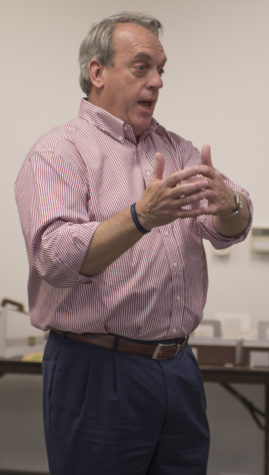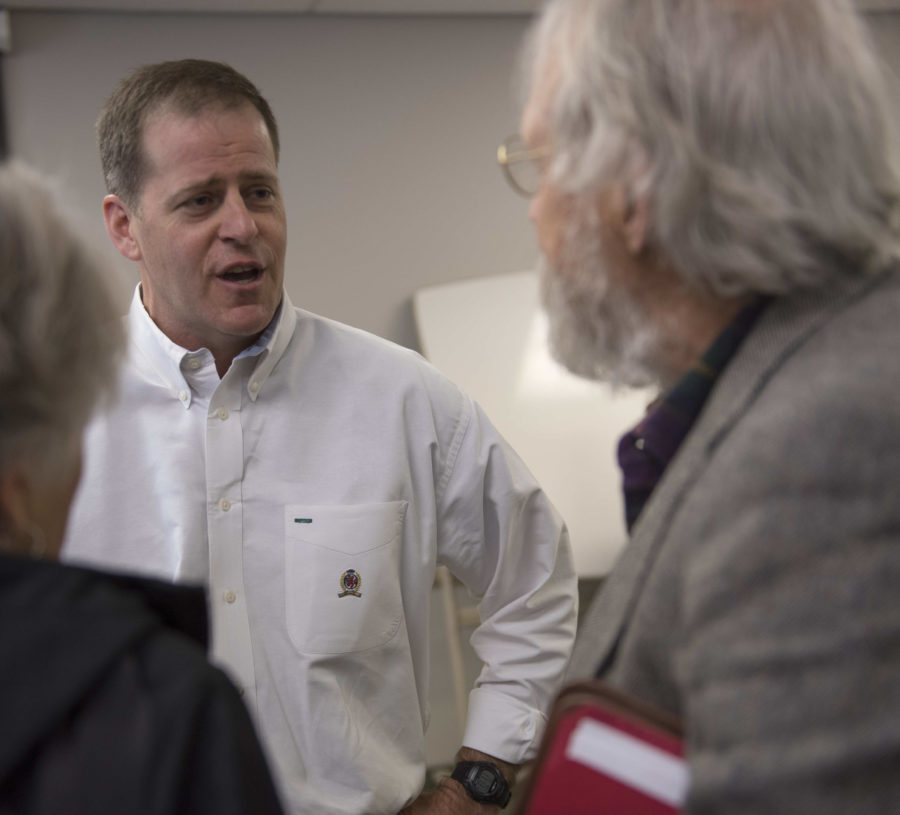State senators address concerns of budget impasse at Carbondale town hall
Illinois Sen. Paul Schimpf, R-Waterloo, speaks with district resident and retired SIU professor Steven Kraft on Saturday, April 1, 2017, after a town hall meeting at Carbondale Township Hall. (Bill Lukitsch | @lukitsbill)
April 1, 2017
The state’s ongoing budget impasse was a common concern southern Illinois residents voiced at a town hall meeting with Sens. Paul Schimpf and Dale Fowler on Saturday morning.
About 85 people gathered in the Carbondale Township Building to ask the state senators what they are doing to resolve a political gridlock in Springfield that is approaching the two-year mark. Several addressed the effects on local social service programs and Southern Illinois University, the region’s largest employer.
At issue were some of the items on Republican Gov. Bruce Rauner’s Turnaround Agenda, a wish list of structural reforms for the state that includes workers’ compensation reform, term limits for state legislators and a property tax freeze. Attendees also brought Democratic House Speaker Michael Madigan — who has been accused of continuing the budget crisis for political gain — into the fray.
Advertisement
Speaking of Gov. Bruce Rauner during public comments, Carbondale Councilman Lee Fronabarger said he thinks “it is the wrong approach to hold the state hostage just for a few reforms when the rest of the state is crumbling.”
Cathy McClanahan, executive director of the Women’s Center, which offers programs to victims of domestic violence and sexual assault and serves about 1,200 people annually, said the center has not received a payment from the state since December.
“We have about three months’ worth of payroll left in order to keep the building open and keep it going,” she said.
Schimpf responded by saying there are many examples of suffering the budget has caused. He and Fowler thanked McClanahan for bringing the matter to their attention and said they would seek a resolution to the problem.
“There are companies right now that are wanting to come to the state of Illinois,” Fowler said. “… but they’re not coming to the state of Illinois because we don’t have these several reforms, especially in our workers’ compensation.”

While both Fowler and Schimpf agreed structural reforms are essential to spurring economic development in the region, they denied accusations of favoring the interests of the Illinois Republican Party and the governor over their constituents.
Asked why he did not vote for the Illinois Senate’s failed Grand Bargain, a bipartisan effort to end the impasse, Schimpf said he could not support it for a number of reasons, including its lack of essential structural reforms and changes to the state’s pension programs.
Advertisement*
Schimpf repeated the position he took on the campaign trail, saying: “We can’t cut our way out, we can’t tax our way out; we have to try to grow our way out.”
Schimpf added that tax increases are an option he would consider in a bipartisan compromise, so long as they are “accompanied by some kind of reform.”
In the 11 weeks since they were elected to office, Fowler said he and Schimpf have made “tough votes” out of turn with the Illinois Republican Party for the good of their districts, a measure he promised to continue.
“We’re going to vote with our district in mind,” Schimpf added. “I can promise you that.”

A number of the constituents in attendance were current or former university employees, most of whom spoke of the recent cuts at the university as a result of the state’s inability to pass a spending plan.
SIU Faculty Association President David Johnson asked the senators whether they would support a stopgap budget for university funding with “no strings attached,” alluding to the structural reforms the governor has placed as contingent upon creating a spending plan for the state.
Both senators said they would.
Stacey Sloboda, an associate professor in the university’s School of Art and Design, said at the meeting she had accepted another teaching position and planned to leave SIU because of the uncertainty that has come with the state budget impasse.
“It breaks my heart to go,” she said. “It is happening because of the budget. I would have never, ever looked for another job. I love SIU.”
Andrea Imre, a librarian at Morris Library, said the current situation in state politics has caused her and others to lose faith in the system.
“Anyone that can leave is just going to leave,” Imre said.
The comments from SIU employees come as university leaders have announced budget reductions they expect will lead to layoffs at the Carbondale campus.
In a letter Wednesday, SIU President Randy Dunn announced a $30 million spending cut at the university system’s largest campus. He also suggested the university declare a short-term financial emergency and borrow money from its sister campus, Southern Illinois University-Edwardsville, to maintain operations.
A follow-up report from interim Chancellor Brad Colwell indicated the university would implement a permanent cut of $10 million for vacant positons, which translates to 158 fewer jobs in addition to the 293 that have already gone unfilled since the budget impasse began in 2015.
One questioner asked the senators to give advice to her niece, a prospective graduate student in creative writing, because of concerns over the university’s financial problems.
“She’s going to have to make a decision,” Schimpf said. “She’s going to have to weigh the awful uncertainty that we in Springfield have created … this is something where our political system is letting our state down; it’s letting our region down.”
Campus editor Bill Lukitsch can be reached at [email protected] or on Twitter @lukitsbill.
To stay up to date with all your SIU news, follow the Daily Egyptian on Facebook and Twitter.
Advertisement









